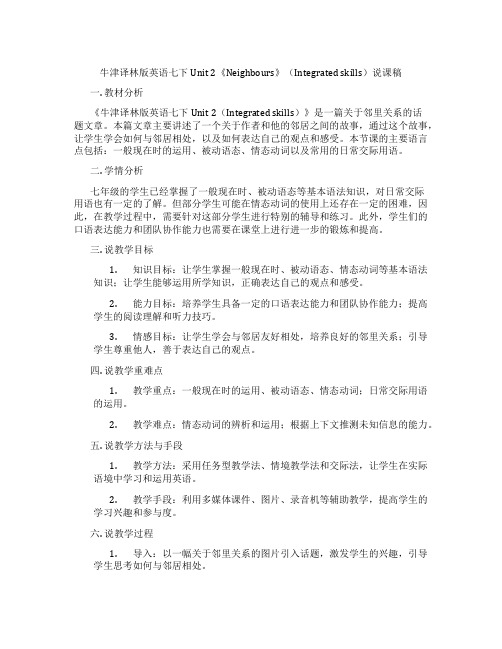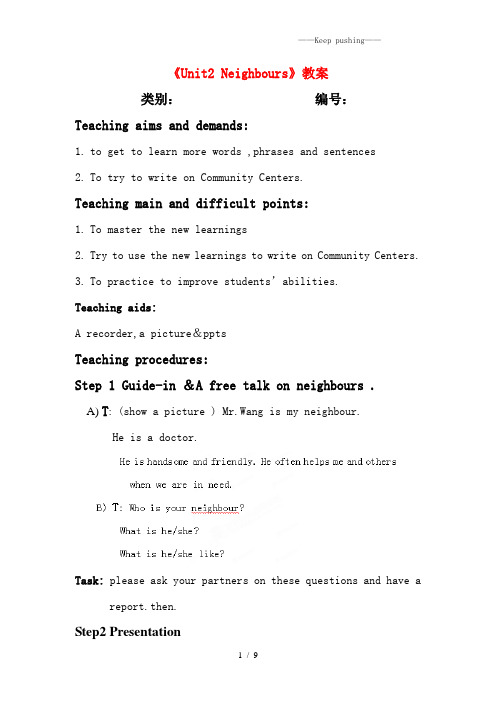牛津译林版七年级下册Unit 2《Neighbours》(Period 1)word课时训练
译林牛津版初中英语七年级下Unit 2 Neighbours 第1课时Wecome教学案(三单模式)

7B Unit 2 Neighbours Comic strip & Welcome to the unit(第一课时)问题导学单【温故知新】根据首字母或中文提示写出单词。
1.I have two new_______(邻居).They are kind.2. I_______(将)have noodles for supper.3.A lot of _______(参观者)come to visit our library.4. I'd like to live in a hotel l_______ this.5. The man is a w_______ in the restaurant.【预习导航】一、找出本课中的生词,猜测词义,并注上音标试着拼读,然后听磁带读会。
二、句型转换。
1.The boy is going to see his father.(改为一般疑问句)_______ the boy_______ to see his father?2.Mike is going to call his brother.(同义句转换)Mike_______ _______ his brother.3.I am afraid that l will meet the man.(同义句转换)I am afraid_______ _______ the man.4.Most students like pop music.(同义句转换)_______ _______ the students like pop music.5.Jack listens to new songs every week.(用next week改写句子)Jack_______ _______ _______ listen to new songs next week.三、听磁带预习P18-19。
每周一句:Well begun is half done 良好地开端是成功的一半。
牛津译林版英语七下Unit 2《Neighbours》(welcome to the unit)教学

牛津译林版英语七下Unit 2《Neighbours》(welcome to the unit)教学设计一. 教材分析牛津译林版英语七下Unit 2《Neighbours》主要讨论了与邻居相关的日常交流用语。
通过本单元的学习,学生将能够掌握与邻居交流的基本用语,描述邻居的特点以及日常生活中与邻居的互动。
本单元主要包括以下几个部分:welcome to the unit、read and write、listen and say、look and say、task、self-check以及word bank。
二. 学情分析学生在进入七年级下学期时,已经具备了一定的英语基础,能够进行简单的英语听说读写活动。
但部分学生对于日常英语交流仍感到困难,特别是在实际应用中,可能出现表达不准确或胆怯的情况。
因此,在教学过程中,需要关注学生的个体差异,鼓励他们积极参与课堂活动,提高他们的自信心。
三. 教学目标1.知识目标:学生能够掌握与邻居交流的基本用语,描述邻居的特点以及日常生活中与邻居的互动。
2.能力目标:学生能够在实际情景中运用所学知识进行日常英语交流,提高他们的口语表达能力。
3.情感目标:学生能够学会尊重他人,培养良好的邻里关系。
四. 教学重难点1.重点:学生能够掌握与邻居交流的基本用语,描述邻居的特点以及日常生活中与邻居的互动。
2.难点:学生在实际情景中运用所学知识进行日常英语交流,特别是听力和口语能力的运用。
五. 教学方法1.情境教学法:通过设置各种与邻居相关的实际情景,让学生在情境中学习与练习英语。
2.交际教学法:鼓励学生积极参与课堂互动,进行真实的英语交流。
3.任务型教学法:通过完成各种任务,让学生在实践中运用所学知识。
六. 教学准备1.教师准备:提前熟悉教材内容,了解学生的学习情况,设计合理的教学活动和任务。
2.学生准备:预习教材内容,了解本单元的学习目标。
七. 教学过程1.导入(5分钟)教师通过提问方式引导学生回顾上一单元学到的内容,如家庭成员的称呼和特点。
牛津译林版英语七下Unit2《Neighbours》(Integratedskills)说课稿

牛津译林版英语七下Unit 2《Neighbours》(Integrated skills)说课稿一. 教材分析《牛津译林版英语七下Unit 2(Integrated skills)》是一篇关于邻里关系的话题文章。
本篇文章主要讲述了一个关于作者和他的邻居之间的故事,通过这个故事,让学生学会如何与邻居相处,以及如何表达自己的观点和感受。
本节课的主要语言点包括:一般现在时的运用、被动语态、情态动词以及常用的日常交际用语。
二. 学情分析七年级的学生已经掌握了一般现在时、被动语态等基本语法知识,对日常交际用语也有一定的了解。
但部分学生可能在情态动词的使用上还存在一定的困难,因此,在教学过程中,需要针对这部分学生进行特别的辅导和练习。
此外,学生们的口语表达能力和团队协作能力也需要在课堂上进行进一步的锻炼和提高。
三. 说教学目标1.知识目标:让学生掌握一般现在时、被动语态、情态动词等基本语法知识;让学生能够运用所学知识,正确表达自己的观点和感受。
2.能力目标:培养学生具备一定的口语表达能力和团队协作能力;提高学生的阅读理解和听力技巧。
3.情感目标:让学生学会与邻居友好相处,培养良好的邻里关系;引导学生尊重他人,善于表达自己的观点。
四. 说教学重难点1.教学重点:一般现在时的运用、被动语态、情态动词;日常交际用语的运用。
2.教学难点:情态动词的辨析和运用;根据上下文推测未知信息的能力。
五. 说教学方法与手段1.教学方法:采用任务型教学法、情境教学法和交际法,让学生在实际语境中学习和运用英语。
2.教学手段:利用多媒体课件、图片、录音机等辅助教学,提高学生的学习兴趣和参与度。
六. 说教学过程1.导入:以一幅关于邻里关系的图片引入话题,激发学生的兴趣,引导学生思考如何与邻居相处。
2.呈现:通过课件展示文章标题和作者,然后逐段呈现文章内容,让学生听录音并跟读。
3.讲解:针对文章中的重点语法点和词汇,进行讲解和示范,让学生模仿和练习。
牛津译林版英语七下Unit 2《Neighbours》(Reading 1)教学设计

牛津译林版英语七下Unit 2《Neighbours》(Reading 1)教学设计一. 教材分析牛津译林版英语七下Unit 2《Neighbours》(Reading 1)主要讲述了澳大利亚的一种特殊生活方式。
通过讲述澳大利亚人与邻居之间的互动,让学生了解不同国家的文化差异,提高跨文化交际能力。
文章以记叙文形式展开,包含一些生活场景和人物对话,贴近学生生活实际,激发学生学习兴趣。
二. 学情分析七年级学生已具备一定的基础知识和英语听力能力,能够理解和运用日常生活中的基本词汇和句型。
但部分学生对澳大利亚文化了解不多,可能对文章内容产生困惑。
因此,在教学过程中需要关注学生的文化背景知识,引导学生理解并欣赏不同国家的文化。
三. 教学目标1.知识目标:–掌握文章中出现的重点词汇和短语;–理解文章的主旨和作者观点;–学会描述人物和场景的英语表达方式。
2.能力目标:–提高学生的阅读理解能力;–培养学生的跨文化交际意识;–提升学生的英语听说能力和合作能力。
3.情感目标:–培养学生对不同文化的尊重和理解;–增强学生学习英语的兴趣和自信心。
四. 教学重难点•文章中出现的重点词汇和短语;•人物关系和场景描述。
•澳大利亚文化的理解;•描述人物和场景的英语表达方式。
五. 教学方法1.任务型教学法:通过设定各种任务,让学生在实践中学习和运用英语;2.情境教学法:创设真实的生活场景,帮助学生理解文章内容和提高语言运用能力;3.交际教学法:鼓励学生参与课堂互动,培养学生的交际能力和合作精神。
六. 教学准备1.教材:牛津译林版英语七下Unit 2《Neighbours》(Reading 1);2.多媒体设备:电脑、投影仪、音响等;3.教学素材:相关澳大利亚文化的图片、视频等;4.作业布置:提前让学生预习文章内容,了解澳大利亚文化。
七. 教学过程1.导入(5分钟)–利用图片和视频介绍澳大利亚文化,激发学生兴趣;–引导学生谈论与邻居之间的互动,自然引入文章主题。
Unit2Neighbours知识讲义牛津译林版英语七年级下册

牛津版译林英语7B知识点总结Unit2 Neighbours1.Where are you going?【知识点一】:be doing(1)现在进行时表将来(2) go、e、leave、move表示移动的词,都可以用“现在进行时表将来”(3)进行时开始表示:近期一直在做某事2. I'm afraid they won't wele visitors like you. 恐怕他们不会欢迎像你这样的客人。
(P18)【知识点一】afraid adj. 害怕的(1) I'm afraid (that) + 宾语从句, 恐怕Eg. I’m afraid (that) you are wrong.(2) be afraid of doing sth 害怕做某事= be afraid to do sth(3) I'm afraid not. 恐怕不是这样的。
Eg.—Can you get there before 6 o’clock? —I’m afraid not.(4) I'm afraid so. 恐怕是这样的。
Eg.—Is it going to rain tomorrow? —I’m afraid so.【随堂练习】1. —Will your father e to see your piano show tomorrow?— . He is having an important meeting in Beijing now.A. They'd like toB. You're rightC. I'm afraid soD. I'm afraid not2. —Would you like to help me with my lessons?—Sorry. .I have no time now .A. I'm sure.B. I'm afraid.C. I'd like.D. I hope.【知识点二】visitor (n.)拜访者①visit v. 参观;拜访n. 参观visit sp. = be on a visit to sp.②构词法:动词+or→表示人的职业或身份act→ actor invent→ inventor collect→ collector【随堂练习】1. Do you know the (visit) telephone numbers? I want to call them.【知识点三】like(1) v. 喜欢like doing sth./ like to do sth. 反义词:dislike = hate(2) prep. 像反义词:unlikebe like/look like①问性格,品质What be sb. like?Eg.—What is he like? —He is kind and helpful.②问外貌:What does sb. look like? = How does sb. look?Eg.—What does he look like? = How does he look?—He looks tall and strong.区别:What does sb like (doing)? 问爱好(3)不能单独作谓语: be like 像…look like 看起来像… sound like听起来像【随堂练习】1.The boy, his father, playing football.A. like;likesB. likes;likeC. liked;likeD. like; will like2.— __________ your hometown like? —It’s a good place ___________.A. How is; to liveB. How does; to liveC. What is; livingD. What is; to live3. What is your father like?A. He likes history best.B. He likes eating meat.B. He is kind and friendly. D. He is forty years old.补: 问职业①What be sb? ②What be sb’s job? ③What do/does sb do?3. How many buildings are there in your neighbours? 在你居民区有多少幢楼?【知识点一】how often, how many times, how soon, how long 与how far的区别【随堂练习】1. — ______ do you help your parents do housework? — Every evening.A. How oftenB. How longC. How soonD. How far2. — ______ music do you listen to every day? —One hour.A. How manyB. How longC. How soonD. How much3. — ______ hours of music do you listen to every day? —One.A. How manyB. How longC. How soonD. How much4. — ______ will you e back? —In two days.A. How oftenB. How longC. How soonD. What time4. Most of them have 14 floors. 它们大多数有14层。
牛津译林英语七年级英语下册unit2neighbours知识点归纳

一、知识要点1.Where are you going?你打算去哪里?be going此处为“现在进行时表将来”。
现在进行时表将来主要用于表示按计划或安排将要发生的动作,常有“意图”“安排”或“打算”的含义。
这种现在进行时比较生动,给人一种期待感。
go, come, leave等表示位移的动词,都可以用于现在进行时表将来。
例如:He is going. 他要走了。
I’m coming. 我要来了。
Tom is leaving. 汤姆要走了。
2. I’m going to vi sit our new neighbours.我打算拜访我们的新邻居。
be going to意为“计划,打算”,后接动词原形,用于表将来。
例如:I’m going to wash the car if I have time. 若有时间我想洗洗车。
Where are we going to stay tonight? 我们今晚住哪里?3. I’m afraid they won’t welcome visitors like you.恐怕他们不会欢迎像你一样的拜访者。
(1)welcome作及物动词,意为“欢迎’’,可与介‘词to连用;也可作形容词,意为“受欢迎的"。
如:Welcome you to our school! 欢迎到我们学校来!You’re welcome.不用谢。
(2)句中like是介词,意为“像,相似’’,其反义词是unlike;作动词时,意为“喜欢’’,后可接动名词或不定式作宾语。
如:What is Jim like? 吉姆这个人怎么样?They like playing football on Sunday.他们喜欢在星期天踢足球。
(3)won’t是will与not的缩略形式。
“will+动词原形"也是一般将来时的构成之一。
如:We will take a bus to work.我们将乘公共汽车上班。
牛津译林版英语七年级下册Unit 2 Neighbours 第一课时 课件

I’m afraid my mother has no time to play with me.
Role play the conversation with your partner.
What’s your neighbour?
A: What does your neighbour do? B: He/She is a/an...... A: Where does he/she work then? B: He/She works ...... A: What about you? B: I want to be .......and work......
teacher student
school
Do you know what they are and where they work?
farmer
on a farm
Do you know what they are and where they work?
office worker
in an office
Listen and answer
Eddie and Hobohat are they going to do? They are going to visit their new neighbours. Will Eddie go and visit the new neighbours? Yes ,he will.
Help Simon to complete his article with the words in the box.
牛津译林版七年级英语下册《Unit2 Neighbours》教案

《Unit2 Neighbours》教案类别:编号:Teaching aims and demands:1.to get to learn more words ,phrases and sentences2.To try to write on Community Centers.Teaching main and difficult points:1.To master the new learnings2.Try to use the new learnings to write on Community Centers.3.To practice to improve students’abilities.Teaching aids:A recorder,a picture&pptsTeaching procedures:Step 1 Guide-in &A free talk on neighbours .A) T: (show a picture ) Mr.Wang is my neighbour.He is a doctor.Task: please ask your partners on these questions and have a report.then.Step2 PresentationA)Topic: Who can help me?(To get to know and learn the things in next part)T: My neighbours have some problems .Who can help them ?Do you have any good ideas?(Give out some notes with the problems to some students and,have them act out then)S1: hello! I’m Mrs.Li. My washing machine isn’t working. Who can help me?S2:Good morning! I’m Mr.zhang . There is something wrong with my computer.Who can help me?S3: Hi! My name is Wang Xin. My bike is broken. Who can help me?S4:I’m Miss zhao. Im going to have a party tonight. What shouldI wear?S5:I’m Mike.I don’t know how to design my room, can you help me?S6:Im GrannyLi. I’m not feeling well these days?Have students discuss in groups of six(each group resolve one problem) and then give out their ideas.B)T: People should help each other in a neighbourhood. So thecommunity center is very useful.Read the notices below and try to find more ways to help myneighbours(Listen and read the notices of part A)Have a free talk:(To show what ss have got from the topic.)Ss: Mrs.Li and Wang Xin .can get help from the Fix-it Club. Mr.zhang and GrannyLi should go to the Health Centre to ask for help.Miss zhao and Mike should go to Art&Dsign Group to get some good ideas.C)T: I think a community centre is very helpful.Everything will be better with its help.Itprovides useful information.The volunteers wouldlike to do anything to help us.D) Complete PB(To learn the notices better)Have students try to finish the task on their own. and then show the answers on blackboard.(1)community centre(2) 5 March(3)doctors and nurses(4)make them feel better(5) engineers(6) something wrong(7) styles and colours(8) what to wear to a party(9)how to design the home(10)some ideas(E)Have ss read the blog and show theirdifficulties ,disscuss and solve in groupsGive some notes then:1.feel well/better感觉不错2.make . do sth.使、让某人做某事3.worry about 担心,担忧4.know a lot about sth.很了解某物5.be happy to do sth.做某事很高兴6.give/get some ideas 给、得到一些建议7.how to design your home如何设计你的家8.what to wear穿什么(F) Have ss read the blog and try find out how to write about the community center.Paragraph 1Time and place of the“helping hands”meeting Paragraph 2 Different activities of the“ helping hands”meetingStep 3 Writing(To practice and improve ss’ ability of writing.)Task:假设你是社区的一名志愿者,本周社区将邀请几位专家到社区中心为市区居民提供志愿服务。
- 1、下载文档前请自行甄别文档内容的完整性,平台不提供额外的编辑、内容补充、找答案等附加服务。
- 2、"仅部分预览"的文档,不可在线预览部分如存在完整性等问题,可反馈申请退款(可完整预览的文档不适用该条件!)。
- 3、如文档侵犯您的权益,请联系客服反馈,我们会尽快为您处理(人工客服工作时间:9:00-18:30)。
Unit 2 Neighbours
Period 1:Comic strip & Welcome to the unit
Name_______Class_______ 【基础训练】
I. 看图写出他们的职业。
1. _________
2. ________
3. ________
4. _________
5. _________
6. ________
7. ________
8. _________
1. 2. 3. 4.
5. 6. 7.
II. .用所给词的适当形式填空
1. Where are you ______(go)?
2. I’m going to ______(visit) my new classmates.
3. I’ll ______(meet) them at the school gate.
4. They won’t ______(welcome) the visitor like you.
5. The teachers in the school are kind and ______(help).
6. There are many _____(build) in our neighbourhood.
【巩固提高】
III. 句型转换
1. Her uncle is a policeman. (就划线部分提问)
What _______ her uncle _______?
2. He is going to visit his neighbours.(改为一般疑问句)
_____ he _____ to visit his neighbour?
3. We will meet at the school gate. (对划线部分提问)
______ ______ you meet?
4. Are they going to do some shopping this weekend?(肯定回答)
______ _________.
5. They will go shopping this weekend.(改为否定句)
They ______ _____ shopping this weekend.
IV. 根据汉语意思完成句子
1. 这个星期天我将邀请我的朋友一起去游泳。
I _____ _____ my friends to swim this Sunday.
2. 他妈妈在医院工作。
His mother works _______ _______ _______.
3. 我认为像你这样的参观者他们是不会欢迎的。
I think they won’t ______ _______ _______ you.
4. 我们打算明天要去参观他们的学校。
We _____ ______ _____ visit their school tomorrow.
【拓展延伸】
V. 完形填空
My uncle is a policeman. He works ___1____ a police station in Chengdu. He ___2____ his job. He often says ____3___ work is very exciting and funny, although it’s kind of ___4____. He often helps people in trouble(处于困难). ____5___ he has to work on weekends.
My uncle ____6___ many hobbies. He is good at sports. He likes ball games, and he likes playing ____7___ best. He says he is the best player among his friends. He also sings ___8____. My Heart Will Go On is his favorite. When he is free, he likes to teach me to ____9___ songs.
I want to be a policeman like my uncle ___10___I grow up. So I must study hard and keep healthy.
( )1. A. from B. in C. on D. of
( )2. A. wants B. needs C. likes D. gives
( )3. A. the B. a C. an D. /
( )4. A. interesting B. beautiful C. careful D. dangerous ( )5. A. Sometimes B. Usually C. Sometime D. Always
( )6. A. likes B. has C. thinks D. does
( )7. A. basketball B. games C. money D. cards
( )8. A. quickly B. quietly C. hard D. well
( )9. A. sing B. dance C. play D. work
( )10. A. if B. before C. as D. when
VI. 任务型阅读
Music teachers Wanted
Do you like to dance and sing? Do you like to be with children of 7-12? Can you play the guitar, piano and violin? If your answer is “Yes”, then we have a job for you.
We are Mr. White’s school for children. Our students are from Canada and Australia, so you must speak English. We need three music teachers for children. If you get this job, you can get $300 every month.
Please call Mary at 556-2345 before August 20. You can come to our school this Sunday. Our school address is No. 99, Green Street.
根据短文内容,完成下列表格。
[答案]
I. 1. nurse 2. student/pupil 3. teacher 4. worker 5. doctor 6. policeman 7. waiter
8. reporter
II. 1. going 2. visit 3. meet 4. welcome 5. helpful 6. buildings
III. 1. does; do 2. Is; going 3. Where; will 4. Yes, they are 5. won’t go IV. 1. will invite 2. in a hospital 3. welcome visitors like 4. are going to V. 1. B in a police station“在警察局”,为固定搭配。
2. C 本句意为“他喜欢他的工作”,like“喜欢”。
3. A 这里表示特指,用定冠词the。
4. D 本句意为“他常说这份工作虽然有危险,但很有趣并令人兴奋”,dangerous“危险的”。
5. A 表示“有时”用副词sometimes。
6. B have a hobby“有爱好”,主语为my uncle,所以这里用has。
7. A 由上句He likes ball games可判断,这里用表示“球类”名词basketball填写。
8. D sing well“唱得好”,well意为“好”。
9. A sing songs“唱歌”。
10. D 本句意为“我长大要像我叔叔那样当警察”,when“当……时候”。
VI. 1. music teacher 从第一段的内容及句子We need three music teachers for children.可判断,他们要招聘音乐教师。
2. guitar 根据句子Can you play the guitar, piano and violin?可填写本题答案。
3. three 由句子We need three music teachers for children.可判断,要招聘三位教师。
4. English 从句子so you must speak English可判断,所招聘的教师要会说英语。
5. 556-2345 从句子Please call Mary at 556-2345中可找到电话号码。
